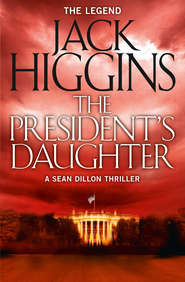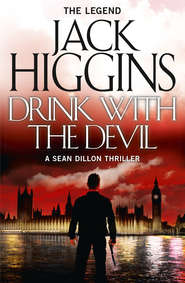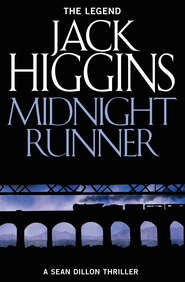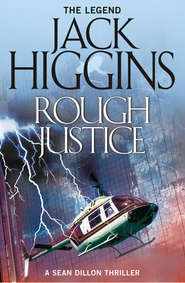По всем вопросам обращайтесь на: info@litportal.ru
(©) 2003-2024.
✖
The Death Trade
Автор
Год написания книги
2019
Настройки чтения
Размер шрифта
Высота строк
Поля
‘The bastards take pleasure in finishing everyone off,’ Hassan told him, leading the way downstairs and into the kitchen.
There was an eerie quiet, the aroma of good coffee from an electric percolator, an old AK-47 assault rifle lying on the table. Hassan went into the café and returned with a bottle of Courvoisier cognac, LeBlanc put his bag on the table and picked up the rifle as Hassan got the bottle open.
‘May Allah forgive me.’ He raised it to his mouth. At the same moment, the outside door was kicked aside and a brute of a man, bearded, long hair bound by a bandanna, slipped in. He was carrying a Mac 10 machine pistol.
‘Drop it or I’ll drop you,’ he told LeBlanc, who placed the AK-47 on the table at once.
‘Of course,’ he said.
The man reached for the bottle. ‘Cognac, eh? Are we celebrating something your old friend Hamid should know about?’ He poured some into his mouth. ‘Good stuff. Seems a shame to keep it all for ourselves. Why don’t you let your wife and daughters out of the cellar so they can join the party.’
‘No, damn you, I will not do it,’ Hassan said violently.
Hamid raised the Mac, and LeBlanc cried, ‘No need for that! I have money, see?’ He unzipped the bag, reached into the false bottom, produced a wad of currency, and dropped it on the table. ‘A thousand American dollars.’
Hamid was mesmerized and reached out to examine the money for himself. ‘Where did you get this?’
‘Tehran,’ LeBlanc told him. ‘And there’s more. Just let us go.’
‘Show me,’ Hamid ordered.
LeBlanc scrabbled in the bottom of the bag, but instead of pulling out more money, he produced a Russian Makarov fitted with a silencer and shot Hamid between the eyes, fragmenting the back of his skull and hurling him outside into the street through the open door. A dull thud was the only sound.
It was darker now, starting to rain on the dead, and Hassan kicked Hamid’s body. ‘Bastard,’ he said, picked up the corpse by its long hair, and dragged it out to where the rest of the bodies lay.
He turned to LeBlanc, who had followed, and grabbed him in a huge embrace. ‘How can I repay you?’
‘That your wife and daughters are safe from harm is thanks enough. It was fortunate I had the pistol. Normally I wouldn’t have such a thing, but it seemed prudent when I started my journey. These are bad times, and more to come, I think.’
‘Then go with a blessing from me,’ Hassan said. ‘Now I must join my family.’ He returned to the café and closed the door.
When LeBlanc checked the yard at the rear, he found the Citroën intact. He found a tap and washed away the blood that had splashed across his face as Hamid’s skull exploded, using a scarf he found in the car, then checked the contents of the bag. A little blood he had missed on his left hand smeared the Iranian passport, and that gave him an idea. What if his Iranian passport, his true identity, turned up on one of the victims in the street, a body so damaged it could not be identified? He got in the Citroën and drove across the square to the mosque.
The piles of bodies were truly shocking, and there were many badly damaged faces. As the rain increased, he knelt beside one old man, smashed beyond recognition, his white hair soaked in blood. He felt in the man’s inside pockets, removed a couple of letters and an identity card, smeared the Iranian passport with the dead man’s blood, and put it in the pocket. He said a short prayer, returned to the Citroën, and started on the road towards Homs, passing many refugees and a small group of United Nations observers in their blue helmets.
Several hours later, he left the Citroën in Homs and found a taxi driver willing to deliver him to Wadi Khalid on the border with Lebanon, walking through on foot, armed with his Lebanese passport, where he bypassed a crowd of Syrian refugees.
The commander of the border post examined his passport and said, ‘See anything of the troubles in your journey, Doctor?’
‘I’m afraid so. I passed through Houla. A dreadful sight.’
‘It must be good to be home after such an experience.’
‘Yes, indeed.’ Ali LeBlanc passed through and took one of the waiting taxis.
The approach to Beirut an hour later was astonishingly beautiful: the hot sunshine, the vivid blue of the sky and sea, the harbour crowded with ships, the whiteness of the houses jumbled together as they lifted in untidy terraces, climbing the hill of the old quarter together.
He left the taxi by the harbour wall and crossed through the open-air cafés, crowded with people of every race and colour and religion and so very different from what he had come from. He climbed quickly through narrow cobbled alleys, turned into Rue Rivoli, and came to a building several storeys high that was painted a vivid blue. Not surprisingly, a sign by the door said ‘Maison Bleue,’ and he rang the bell.
The woman who answered was someone he knew. Sixty-five, of mixed blood, she was handsome enough, and wore a black silk robe and a white chador, the obligatory headscarf for Muslim women. There was astonishment on her face.
‘Is that you, Doctor? How long since we have seen you?’
‘Five years. How are you, Bibi?’
‘All the better for seeing you.’
‘And the apartment? Everything in order?’
‘Of course. Your arrangements here have never failed.’
And everything was indeed in order: the cool white-painted hall, the ancient lift that took them five floors up, the penthouse apartment with its huge living room, the terrace with the blue-and-white-striped awning and the view over the city and the crowded harbour and away out to sea. He dropped his bag on the coffee table, took off his soiled jacket, and dumped it on the floor. She moved to pick it up.
‘You look terrible, chéri,’ she told him, and there was a certain tenderness in her voice. ‘I think you have come from a bad place.’
‘From hell on earth. I would not have believed such evil could exist if I had not witnessed it with my own eyes.’ He hesitated, then: ‘I killed a man for the first time in my life.’
She said calmly, ‘A bad man?’
‘No, a truly evil man. A murderer of women and children.’
‘Good,’ she said. ‘God has already forgiven you. Sit down and rest. I’ll bring you a coffee with something in it perhaps, run you a bath, and see what’s available in the wardrobe. What you’re wearing will go out with the rubbish tomorrow.’
He sat on the couch by the coffee table, opened the bag and explored the false bottom, taking out further packets of dollars, the Makarov pistol, and a small electronic notebook of the kind that could only be opened by a codeword. All these things he placed on the table, and last of all, he produced a mobile phone that looked like any other but definitely was not. It had unlimited range, a battery that never needed charging. With the press of a button, it was impossible to trace, and he did that now and entered the code of the person who had provided him the phone. She answered immediately, sounding breathless.
‘You didn’t block your location,’ she said. ‘I can see you’re in Beirut. Did you mean to do that?’
‘No, I was careless,’ he replied. ‘I didn’t expect to have to use the phone you gave me in Paris so soon. Where are you?’
‘London, Hyde Park. So tell me, what’s happening?’
‘I’ve done it. I’ve left Iran, left the nuclear facility. The nuclear bomb they’ve had me working on – in theory, it’s ready to produce, but they’d still need me to supervise the construction. I couldn’t stay any longer. I fled to Beirut, and I’m using an alias. They’ll come after me when they find there’s nothing on the computers.’
‘You tried to wipe your research?’ she said. ‘But they can still find it. There’s nothing that can’t be recovered these days.’
‘I know, but it’ll slow them down. And I never put the most important data on the computer in the first place. All my calculations were worked out on paper and then destroyed.’
‘But what about your mother and daughter? Your masters put them under house arrest to ensure your obedience.’
He was silent for a long moment. ‘No more. After Vahidi and I flew back from Paris, he disappeared. When he didn’t rejoin me at the nuclear facility, I asked questions, but nobody would tell me anything. Then I got an anonymous phone call. Apparently, he was driving them to an appointment when their car was hit. My mother, my daughter, they’re dead. Vahidi’s in a military hospital in serious condition.’
‘Oh my God,’ she said. ‘Oh, I’m so very, very sorry. That’s terrible. And you mean to tell me the authorities are putting a lid on it? How stupid. They can’t keep that up for long. I wonder what they’ll do.’
‘I didn’t stop to find out. I’ve been making preparations for years, false passports and money, in the hope that something would come up, although not something as dreadful as this. I left in the middle of the night, but obviously they’ll be after me.’
‘So you haven’t left anything at all that could lead to a computer trail?’
‘It’s all in my head, I told you.’











